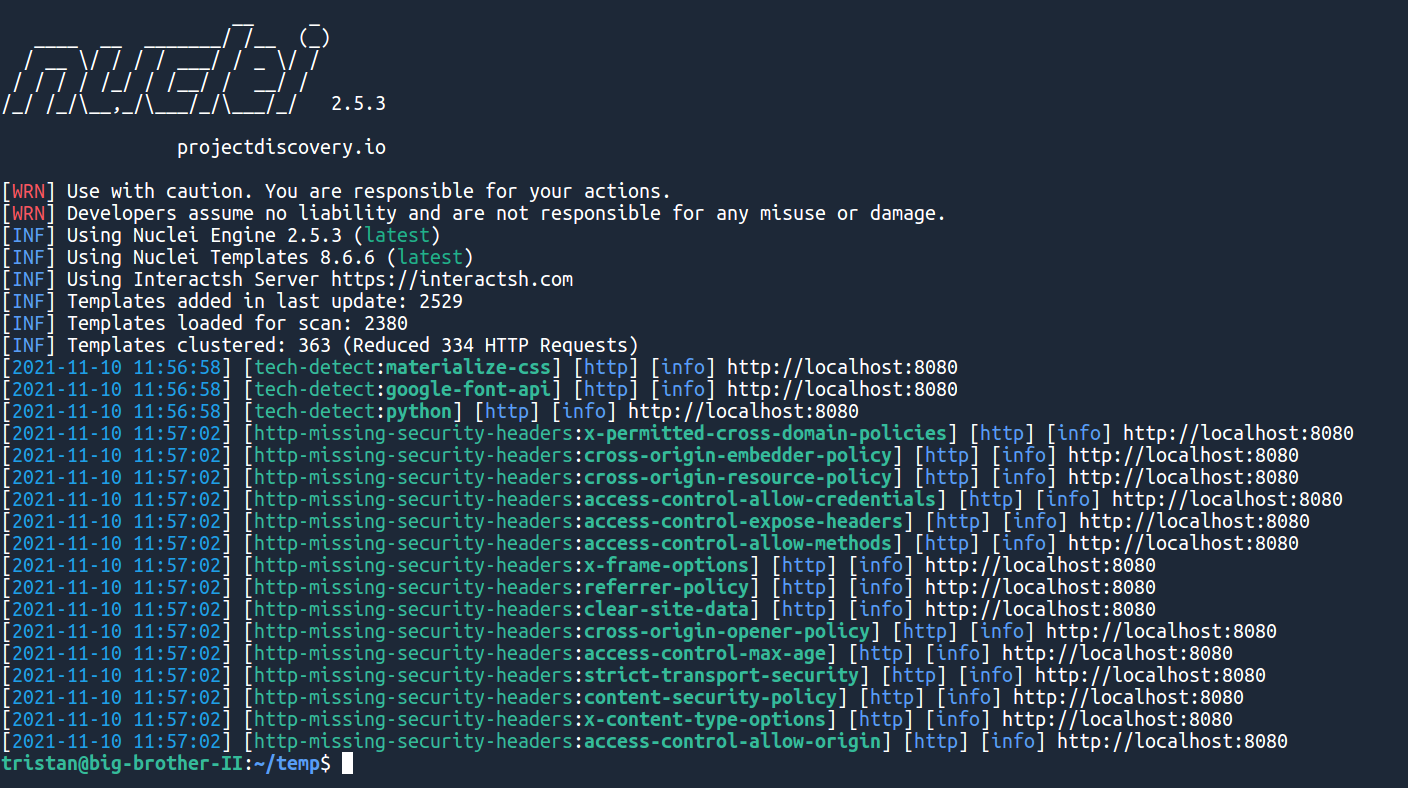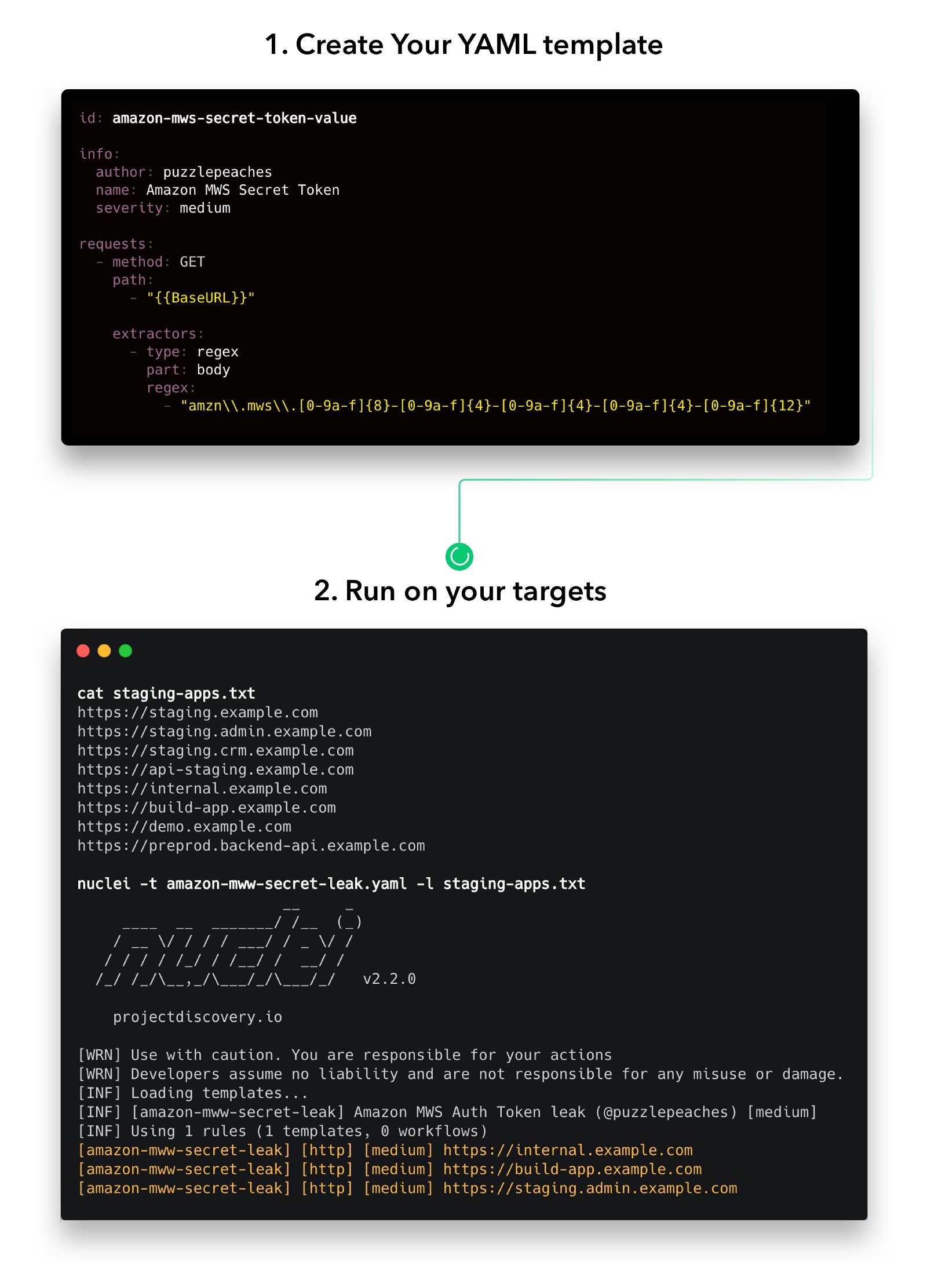Το Nuclei είναι ένα γρήγορο εργαλείο στοχευμένης σάρωση με βάση πρότυπα που προσφέρουν τεράστια επεκτασιμότητα αλλά και ευκολία στη χρήση. Προσφέρει σάρωση για μια ποικιλία πρωτοκόλλων, όπως TCP, DNS, HTTP, SSL, File, Whois, Websocket, Headless κ.λ.π. Με ισχυρό και ευέλικτο templating, το Nuclei μπορεί να χρησιμοποιηθεί για όλων των ειδών των ελέγχων ασφαλείας.

Διαθέτει ένα ειδικό αποθετήριο που παρέχει διάφορους τύπους προτύπων ευπάθειας που συνεισφέρουν περισσότεροι από 300 ερευνητές και μηχανικοί ασφαλείας.
Λειτουργία

Εγκατάσταση
Το Nuclei απαιτεί την go1.19 για να εγκατασταθεί με επιτυχία. Εκτελέστε την ακόλουθη εντολή για να εγκαταστήσετε την τελευταία έκδοση:
go install -v github.com/projectdiscovery/nuclei/v2/cmd/nuclei@latest
Nuclei Templates
Το Nuclei έχει ενσωματωμένη υποστήριξη για αυτόματη λήψη/ενημέρωση προτύπων ως προεπιλογή από την έκδοση v2.5.2. Το Nuclei-Templates poject παρέχει μια λίστα έτοιμων προς χρήση προτύπων που συνεισφέρει η κοινότητα και η οποία ενημερώνεται συνεχώς.
Μπορείτε ακόμα να χρησιμοποιήσετε το update-templates flag για να ενημερώσετε τα πρότυπα του Nuclei ανά πάσα στιγμή. μπορείτε να γράψετε τα δικά σας templates για την ατομική σας εργασία και τις ανάγκες σας ακολουθώντας τον οδηγό δημιουργίας προτύπων του Nuclei.
Η σύνταξη αναφοράς YAML DSL είναι διαθέσιμη εδώ.
Χρήση
nuclei -h
Η παραπάνω εντολή θα εμφανίσει το μενού βοήθειας. Παρακάτω βλέπουμε όλες τις επιλογές που υποστηρίζει.
Nuclei is a fast, template based vulnerability scanner focusing
on extensive configurability, massive extensibility and ease of use.
Usage:
./nuclei [flags]
Flags:
TARGET:
-u, -target string[] target URLs/hosts to scan
-l, -list string path to file containing a list of target URLs/hosts to scan (one per line)
-resume string resume scan using resume.cfg (clustering will be disabled)
-sa, -scan-all-ips scan all the IP’s associated with dns record
-iv, -ip-version string[] IP version to scan of hostname (4,6) – (default 4)
TEMPLATES:
-nt, -new-templates run only new templates added in latest nuclei-templates release
-ntv, -new-templates-version string[] run new templates added in specific version
-as, -automatic-scan automatic web scan using wappalyzer technology detection to tags mapping
-t, -templates string[] list of template or template directory to run (comma-separated, file)
-tu, -template-url string[] list of template urls to run (comma-separated, file)
-w, -workflows string[] list of workflow or workflow directory to run (comma-separated, file)
-wu, -workflow-url string[] list of workflow urls to run (comma-separated, file)
-validate validate the passed templates to nuclei
-nss, -no-strict-syntax disable strict syntax check on templates
-td, -template-display displays the templates content
-tl list all available templates
FILTERING:
-a, -author string[] templates to run based on authors (comma-separated, file)
-tags string[] templates to run based on tags (comma-separated, file)
-etags, -exclude-tags string[] templates to exclude based on tags (comma-separated, file)
-itags, -include-tags string[] tags to be executed even if they are excluded either by default or configuration
-id, -template-id string[] templates to run based on template ids (comma-separated, file)
-eid, -exclude-id string[] templates to exclude based on template ids (comma-separated, file)
-it, -include-templates string[] templates to be executed even if they are excluded either by default or configuration
-et, -exclude-templates string[] template or template directory to exclude (comma-separated, file)
-em, -exclude-matchers string[] template matchers to exclude in result
-s, -severity value[] templates to run based on severity. Possible values: info, low, medium, high, critical, unknown
-es, -exclude-severity value[] templates to exclude based on severity. Possible values: info, low, medium, high, critical, unknown
-pt, -type value[] templates to run based on protocol type. Possible values: dns, file, http, headless, tcp, workflow, ssl, websocket, whois
-ept, -exclude-type value[] templates to exclude based on protocol type. Possible values: dns, file, http, headless, tcp, workflow, ssl, websocket, whois
-tc, -template-condition string[] templates to run based on expression condition
OUTPUT:
-o, -output string output file to write found issues/vulnerabilities
-sresp, -store-resp store all request/response passed through nuclei to output directory
-srd, -store-resp-dir string store all request/response passed through nuclei to custom directory (default “output”)
-silent display findings only
-nc, -no-color disable output content coloring (ANSI escape codes)
-j, -jsonl write output in JSONL(ines) format
-irr, -include-rr include request/response pairs in the JSONL output (for findings only)
-nm, -no-meta disable printing result metadata in cli output
-ts, -timestamp enables printing timestamp in cli output
-rdb, -report-db string nuclei reporting database (always use this to persist report data)
-ms, -matcher-status display match failure status
-me, -markdown-export string directory to export results in markdown format
-se, -sarif-export string file to export results in SARIF format
-je, -json-export string file to export results in JSON format
-jle, -jsonl-export string file to export results in JSONL(ine) format
CONFIGURATIONS:
-config string path to the nuclei configuration file
-fr, -follow-redirects enable following redirects for http templates
-fhr, -follow-host-redirects follow redirects on the same host
-mr, -max-redirects int max number of redirects to follow for http templates (default 10)
-dr, -disable-redirects disable redirects for http templates
-rc, -report-config string nuclei reporting module configuration file
-H, -header string[] custom header/cookie to include in all http request in header:value format (cli, file)
-V, -var value custom vars in key=value format
-r, -resolvers string file containing resolver list for nuclei
-sr, -system-resolvers use system DNS resolving as error fallback
-dc, -disable-clustering disable clustering of requests
-passive enable passive HTTP response processing mode
-fh2, -force-http2 force http2 connection on requests
-ev, -env-vars enable environment variables to be used in template
-cc, -client-cert string client certificate file (PEM-encoded) used for authenticating against scanned hosts
-ck, -client-key string client key file (PEM-encoded) used for authenticating against scanned hosts
-ca, -client-ca string client certificate authority file (PEM-encoded) used for authenticating against scanned hosts
-sml, -show-match-line show match lines for file templates, works with extractors only
-ztls use ztls library with autofallback to standard one for tls13
-sni string tls sni hostname to use (default: input domain name)
-sandbox sandbox nuclei for safe templates execution
-i, -interface string network interface to use for network scan
-at, -attack-type string type of payload combinations to perform (batteringram,pitchfork,clusterbomb)
-sip, -source-ip string source ip address to use for network scan
-config-directory string override the default config path ($home/.config)
-rsr, -response-size-read int max response size to read in bytes (default 10485760)
-rss, -response-size-save int max response size to read in bytes (default 1048576)
-reset reset removes all nuclei configuration and data files (including nuclei-templates)
INTERACTSH:
-iserver, -interactsh-server string interactsh server url for self-hosted instance (default: oast.pro,oast.live,oast.site,oast.online,oast.fun,oast.me)
-itoken, -interactsh-token string authentication token for self-hosted interactsh server
-interactions-cache-size int number of requests to keep in the interactions cache (default 5000)
-interactions-eviction int number of seconds to wait before evicting requests from cache (default 60)
-interactions-poll-duration int number of seconds to wait before each interaction poll request (default 5)
-interactions-cooldown-period int extra time for interaction polling before exiting (default 5)
-ni, -no-interactsh disable interactsh server for OAST testing, exclude OAST based templates
FUZZING:
-ft, -fuzzing-type string overrides fuzzing type set in template (replace, prefix, postfix, infix)
-fm, -fuzzing-mode string overrides fuzzing mode set in template (multiple, single)
UNCOVER:
-uc, -uncover enable uncover engine
-uq, -uncover-query string[] uncover search query
-ue, -uncover-engine string[] uncover search engine (shodan,shodan-idb,fofa,censys,quake,hunter,zoomeye,netlas,criminalip) (default shodan)
-uf, -uncover-field string uncover fields to return (ip,port,host) (default “ip:port”)
-ul, -uncover-limit int uncover results to return (default 100)
-ucd, -uncover-delay int delay between uncover query requests in seconds (0 to disable) (default 1)
RATE-LIMIT:
-rl, -rate-limit int maximum number of requests to send per second (default 150)
-rlm, -rate-limit-minute int maximum number of requests to send per minute
-bs, -bulk-size int maximum number of hosts to be analyzed in parallel per template (default 25)
-c, -concurrency int maximum number of templates to be executed in parallel (default 25)
-hbs, -headless-bulk-size int maximum number of headless hosts to be analyzed in parallel per template (default 10)
-headc, -headless-concurrency int maximum number of headless templates to be executed in parallel (default 10)
OPTIMIZATIONS:
-timeout int time to wait in seconds before timeout (default 10)
-retries int number of times to retry a failed request (default 1)
-ldp, -leave-default-ports leave default HTTP/HTTPS ports (eg. host:80,host:443)
-mhe, -max-host-error int max errors for a host before skipping from scan (default 30)
-te, -track-error string[] adds given error to max-host-error watchlist (standard, file)
-nmhe, -no-mhe disable skipping host from scan based on errors
-project use a project folder to avoid sending same request multiple times
-project-path string set a specific project path (default “/tmp”)
-spm, -stop-at-first-match stop processing HTTP requests after the first match (may break template/workflow logic)
-stream stream mode – start elaborating without sorting the input
-ss, -scan-strategy value strategy to use while scanning(auto/host-spray/template-spray) (default auto)
-irt, -input-read-timeout duration timeout on input read (default 3m0s)
-nh, -no-httpx disable httpx probing for non-url input
-no-stdin disable stdin processing
HEADLESS:
-headless enable templates that require headless browser support (root user on Linux will disable sandbox)
-page-timeout int seconds to wait for each page in headless mode (default 20)
-sb, -show-browser show the browser on the screen when running templates with headless mode
-sc, -system-chrome use local installed Chrome browser instead of nuclei installed
-lha, -list-headless-action list available headless actions
DEBUG:
-debug show all requests and responses
-dreq, -debug-req show all sent requests
-dresp, -debug-resp show all received responses
-p, -proxy string[] list of http/socks5 proxy to use (comma separated or file input)
-pi, -proxy-internal proxy all internal requests
-ldf, -list-dsl-function list all supported DSL function signatures
-tlog, -trace-log string file to write sent requests trace log
-elog, -error-log string file to write sent requests error log
-version show nuclei version
-hm, -hang-monitor enable nuclei hang monitoring
-v, -verbose show verbose output
-profile-mem string optional nuclei memory profile dump file
-vv display templates loaded for scan
-svd, -show-var-dump show variables dump for debugging
-ep, -enable-pprof enable pprof debugging server
-tv, -templates-version shows the version of the installed nuclei-templates
-hc, -health-check run diagnostic check up
UPDATE:
-up, -update update nuclei engine to the latest released version
-ut, -update-templates update nuclei-templates to latest released version
-ud, -update-template-dir string custom directory to install / update nuclei-templates
-duc, -disable-update-check disable automatic nuclei/templates update check
STATISTICS:
-stats display statistics about the running scan
-sj, -stats-json display statistics in JSONL(ines) format
-si, -stats-interval int number of seconds to wait between showing a statistics update (default 5)
-m, -metrics expose nuclei metrics on a port
-mp, -metrics-port int port to expose nuclei metrics on (default 9092)
CLOUD:
-cloud run scan on nuclei cloud
-ads, -add-datasource string add specified data source (s3,github)
-atr, -add-target string add target(s) to cloud
-atm, -add-template string add template(s) to cloud
-lsn, -list-scan list previous cloud scans
-lso, -list-output string list scan output by scan id
-ltr, -list-target list cloud target by id
-ltm, -list-template list cloud template by id
-lds, -list-datasource list cloud datasource by id
-lrs, -list-reportsource list reporting sources
-dsn, -delete-scan string delete cloud scan by id
-dtr, -delete-target string delete target(s) from cloud
-dtm, -delete-template string delete template(s) from cloud
-dds, -delete-datasource string delete specified data source
-drs, -disable-reportsource string disable specified reporting source
-ers, -enable-reportsource string enable specified reporting source
-gtr, -get-target string get target content by id
-gtm, -get-template string get template content by id
-nos, -no-store disable scan/output storage on cloud
-no-tables do not display pretty-printed tables
-limit int limit the number of output to display (default 100)
Τρέχοντας το Nuclei
Σάρωση ενός στόχου με πρότυπα της κοινότητας.
nuclei -u https://example.com
Σάρωση πολλαπλών διευθύνσεων με πρότυπα της κοινότητας.
nuclei -list urls.txt
Παράδειγμα για urls.txt:
http://example.com
http://app.example.com
http://test.example.com
http://uat.example.com
Περισσότερα παραδείγματα επιθέσεων του Nuclei, μπορείτε να βρείτε εδώ.
Μπορείτε να κατεβάσετε το πρόγραμμα από εδώ.



